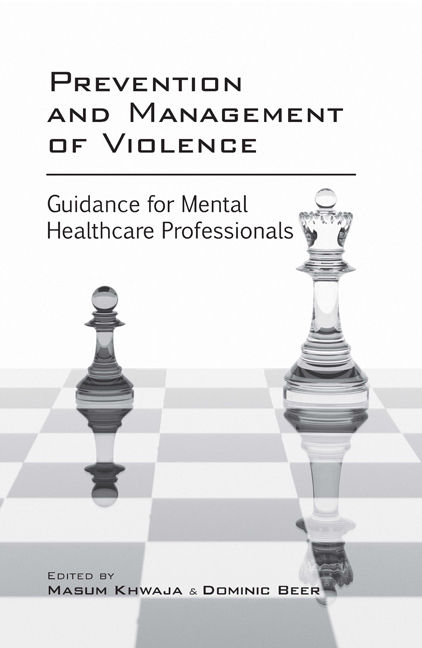Book contents
- Frontmatter
- Dedication
- Contents
- Abbreviations
- List of boxes and tables
- Working group
- Executive summary and recommendations
- 1 Legislation relevant to the management of violence by persons with mental disorders
- 2 Safeguarding vulnerable adults and children exposed to violence
- 3 Risk assessment and management
- 4 Risk prevention and non-pharmacological management of violence in acute settings
- 5 Use of medication and ECT in the management of violence
- 6 Post-incident management
- 7 Management of the risk of violence in the community
- 8 Management of violence in older adults
- 9 Management of violence in people with intellectual disability
- 10 Management of violence in prisons
- 11 Liaison with the police, Crown Prosecution Service and MAPPA
- 12 Information-sharing with victims of crime committed by persons with mental disorders
- 13 Clinical governance
- Appendix Organisations that victims of crime can contact
- Index
6 - Post-incident management
- Frontmatter
- Dedication
- Contents
- Abbreviations
- List of boxes and tables
- Working group
- Executive summary and recommendations
- 1 Legislation relevant to the management of violence by persons with mental disorders
- 2 Safeguarding vulnerable adults and children exposed to violence
- 3 Risk assessment and management
- 4 Risk prevention and non-pharmacological management of violence in acute settings
- 5 Use of medication and ECT in the management of violence
- 6 Post-incident management
- 7 Management of the risk of violence in the community
- 8 Management of violence in older adults
- 9 Management of violence in people with intellectual disability
- 10 Management of violence in prisons
- 11 Liaison with the police, Crown Prosecution Service and MAPPA
- 12 Information-sharing with victims of crime committed by persons with mental disorders
- 13 Clinical governance
- Appendix Organisations that victims of crime can contact
- Index
Summary
Aggression can be expressed in many forms, ranging from a service user raising their voice during an argument to an unprovoked attack involving a weapon. Evidence suggests that all types of aggressive behaviour can pose a threat to the physical and psychological health of the individual(s) involved (Wykes, 1994).
Not all incidents can be prevented, so it is important to have specific procedures in place for responding to incidents. Employers are required to ensure there are systems to support staff affected by an incident under the Health and Safety at Work etc Act 1974.
Mental health service providers should have systems in place with appropriately skilled staff to ensure that a menu of post-incident support and review are available and take place within a culture of learning to make services safer (National Institute for Mental Health in England, 2004). A senior member of staff should coordinate the activities of others post incident. Involving senior members of a team emphasises that incidents of violence are taken seriously.
Post-incident review
Post-incident review is broadly defined as an evaluation of incident response used to identify and correct weaknesses, as well as determine strengths and promulgate them. The establishment of facts surrounding an incident should be undertaken as part of a timely factual ‘debrief’ and the incident reported according to local organisational guidelines. The extent of the post-incident review will depend on the seriousness of the incident.
Psychological debriefing may be defined as a set of procedures including counselling and the giving of information aimed at preventing psychological morbidity and aiding recovery after a traumatic event (Kenardy, 2000). The process of debriefing has two functions: to establish factual details and to provide emotional support. Separating ‘technical’ and ‘emotional’ debriefings may help ensure that people can contribute to the factual investigation of an incident while receiving emotional support.
Although debriefing has not been shown to prevent future psychological distress (Raphael et al, 1985; Rose et al, 2009), the experience of workers in the field is that victims (patient, staff, carers) are grateful for the opportunity to express feelings and achieve some understanding of what happened (McIvor et al, 1997; Bonner & Wellman, 2010), and staff find it helpful to be brought together in a post-incident review meeting to discuss what happened.
- Type
- Chapter
- Information
- Prevention and Management of ViolenceGuidance for Mental Health Professionals, pp. 63 - 66Publisher: Royal College of PsychiatristsFirst published in: 2017



